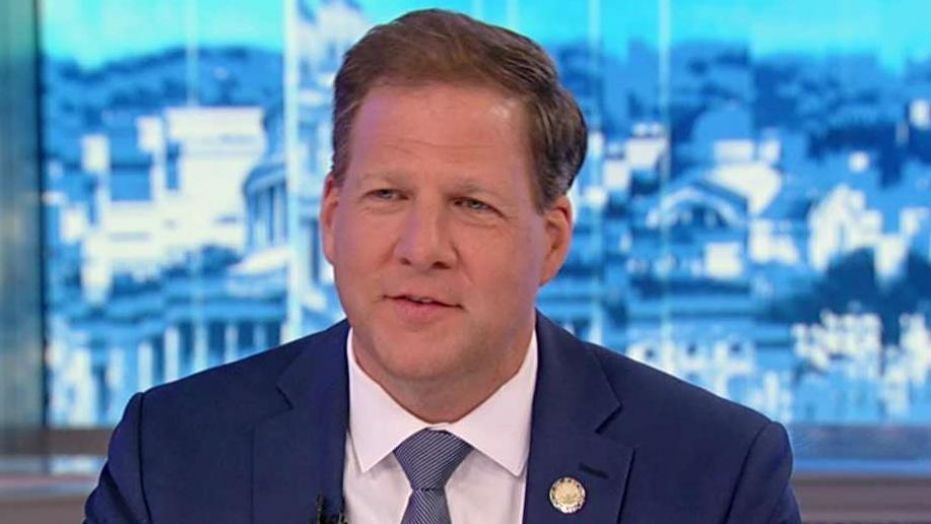Gov. Chris Sununu says an eventual Ukrainian victory over Russia is in “the United States’ direct national security interest” and America must continue to support the war effort, rejecting the policy stance taken by fellow Republicans Donald Trump and Gov. Ron DeSantis.
“This is not a ‘territorial dispute.’ [Ukraine] is a sovereign nation. And the United States has to win there — period. End of story.”
Sununu, a potential 2024 presidential candidate, was asked on WGIR radio Wednesday about DeSantis’ Ukraine policy. DeSantis told Fox News that, “While the U.S. has many vital national interests… becoming further entangled in a territorial dispute between Ukraine and Russia is not one of them.”
It’s a position that mirrors Trump’s view of the Russia-Ukraine conflict, as well as that of Fox News celebrities like Tucker Carlson. More traditional Republicans like former U.N. Ambassador Nikki Haley — a declared 2024 presidential candidate — and former New Jersey Gov. Chris Christie (who might also enter the race) are closer to Sununu on the issue.
“It is in the United States’ direct national security interest to win, to make sure Ukraine wins,” Sununu said. “We don’t need to put troops on the ground and fly planes. It can clearly be done without that. But we need to support (Ukrainian President Volodymyr) Zelensky. We need to support the Ukrainian people.”
“The Ukrainian people have done a tremendous job,” Sununu added. “You back the play, you support the win.”
While DeSantis’ comments sparked immediate blowback from the GOP establishment, his actual position is more nuanced than the “territorial dispute” phrase seized upon by critics. For example, DeSantis didn’t criticize the current level of military support the U.S. has pledged (more than $100 billion to date) or suggest cutting it.
DeSantis also didn’t explicitly reject the possibility of additional funding in the future, though he did place some limits. He doesn’t want the U.S. to commit to a “blank check” of support, and he said America “should not provide assistance that could require the deployment of American troops or enable Ukraine to engage in offensive operations beyond its borders,” adding that providing F-16s and long-range missiles would be “off the table.”
That is currently the position of the Biden administration, noted conservative journalist Byron York.
Former Wyoming Rep. Liz Cheney said DeSantis “is wrong and seems to have forgotten the lessons of Ronald Reagan.” But political insiders say the politics of the Ukraine policy debate are with DeSantis and Trump, at least among likely Republican primary voters.
A January NBC News poll found Republicans opposed increased funding for Ukraine by a two-to-one margin. And a February ABC News poll reported that 50 percent of Republicans said the United States was doing “too much” to support Ukraine, up from 18 percent last April.
Sununu suggested DeSantis’ statement revealed political pandering as opposed to leadership. “I see a lot of politicians who want to hedge around it,” Sununu said. “They don’t want to upset people on Fox News or whatever that nonsense is.
“Whoever’s running [for president] has to define themselves because of what they stand for, not because of what the news is saying. You’ve got to stand on your own two feet.”
DeSantis is consistently polling in second place among likely 2024 GOP presidential candidates, behind Trump and well ahead of the rest of the field. Will DeSantis’ stance impact him in the First in the Nation primary?
“This is both a principled and politically smart statement by Gov. Sununu, though not one I embrace personally,” said veteran GOP communications professional Patrick Hynes. “While the hardcore ‘Trumpy’ base is dead set against helping Ukraine, I speak to more and more Republicans who believe that a great nation must lead the world boldly and that the GOP needs to reclaim its national security and foreign policy bona fides.”
GOP political strategist Andy Surabian, an advisor to Sen. J.D. Vance (R-Ohio) disagrees.
“The average grassroots Republican is a lot more noninterventionist than the average Republican senator,” he told The Washington Post Wednesday. “There’s a giant disconnect between our party’s voters and our party’s elected leaders on that issue.”



